If you’re searching for a psychologist, you might prefer to speak to someone with the same racial heritage as you.
A black therapist will often better understand the psychological traumas, emotional issues, and mental health problems faced by African Americans.
In this guide, we’ve explained how to find a black therapist or counselor near you or online.
Want to skip right to the suggestions for black therapists? Here are our 7 recommended therapy solutions:
- BetterHelp
- Find-a-therapist.com
- Online-therapy.com
- Inclusive Therapists
- Onipa Psychological and Consulting
- Bridges To Wellness
- The Hardy Clinic Wellness Center
How to find a black therapist near me
Many online portals can help you connect with black psychologists.
We’ve looked at seven of these websites below, and also provided the relevant information you need to find a therapist on these platforms, and begin the therapy sessions.
| Provider | Good For | Location | Pricing |
|---|---|---|---|
| BetterHelp | Quick match with the right therapist for you | Online therapy | $65 to $90 per week (billed every 4 weeks) |
| Find-a-therapist.com | Finding and contacting the right therapist for you | Online and in-person therapy | Varies depending on the counselor fee |
| Online-therapy.com | Finding licensed and experienced therapists with a Cognitive Behavioral Therapy (CBT) approach | Online therapy | $40/week to $88/week (including our 20% discount first month) |
| Inclusive Therapists | Finding and contacting the right inclusive therapist for you | Online and in-person therapy in the U.S., Canada, Hong Kong, Portugal, Taiwan, and Thailand | Varies depending on the counselor fee |
| Onipa Psychological and Consulting | African-centered cultural consulting sessions | Online therapy worldwide and in-person therapy in Raleigh, NC | $250 per session |
| Bridges To Wellness | Trauma therapy, identity therapy, depression and anxiety treatment | Online and in-person therapy in Chicago, IL | Varies |
| The Hardy Clinic Wellness Center | Finding a female therapist | Online therapy for Georgia residents | Starting at $145 per session |
1. BetterHelp
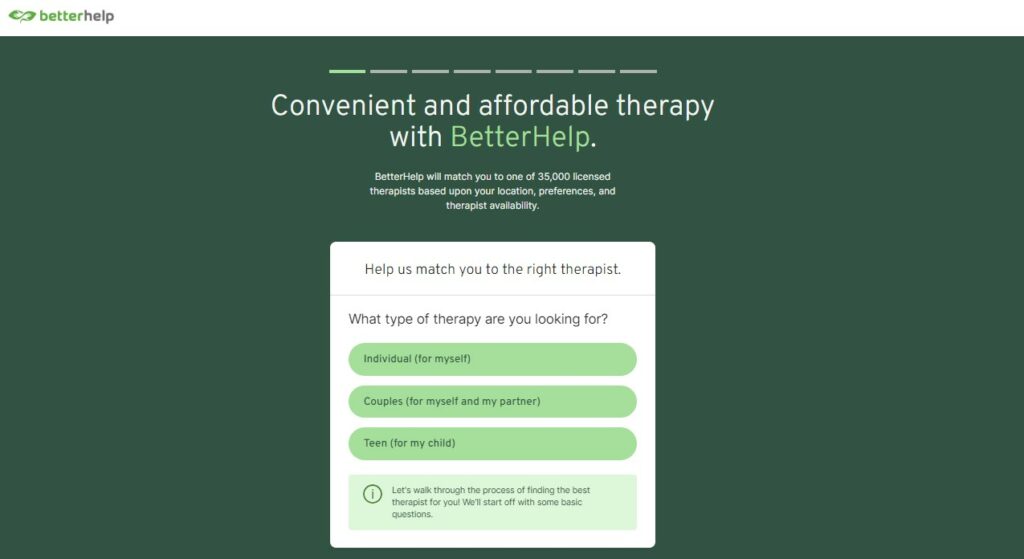
Explore emotional well-being with BetterHelp – your partner in affordable online therapy. With 30,000+ licensed therapists and plans starting from only $65 per week, BetterHelp makes self-care accessible to all. Complete the questionnaire to match with the right therapist.
- Good for: Quick match with the right therapist for you.
- Location: Online therapy.
- Pricing: $65 to $90 per week (billed every 4 weeks).
- Features: iOS and Android app available, message your therapist anytime, live sessions are scheduled weekly and done via live chat, phone, or video call.
BetterHelp is an online portal that gives you access to affordable therapy sessions from the comfort of your own home. When signing up, you can mention what you’re looking for in a psychologist, like a therapist of color or black therapist, and the problems you are going through, and BetterHelp will match you with the right mental health professional.
Read our BetterHelp review here.
2. Find-a-therapist.com
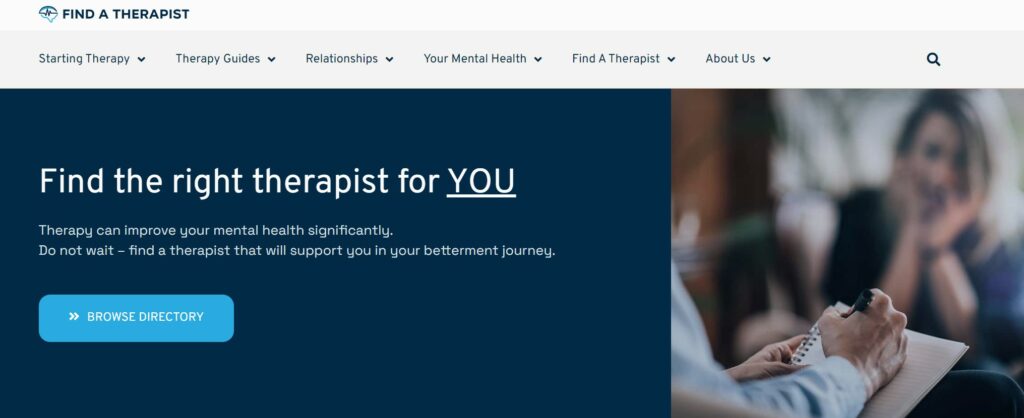
- Good for: Finding and contacting the right therapist for you.
- Location: Online and in-person therapy.
- Pricing: Varies depending on the counselor fee.
- Features: Filter your search, find accessible and effective online and in-person therapy, find guides on different types of therapy.
Find-a-therapist.com is an online directory that enables users to customize their search for therapists based on various criteria, which helps you find a black therapist if you prefer. This feature is designed to improve the user experience, offering detailed profiles of each one of the therapists.
3. Online-therapy.com
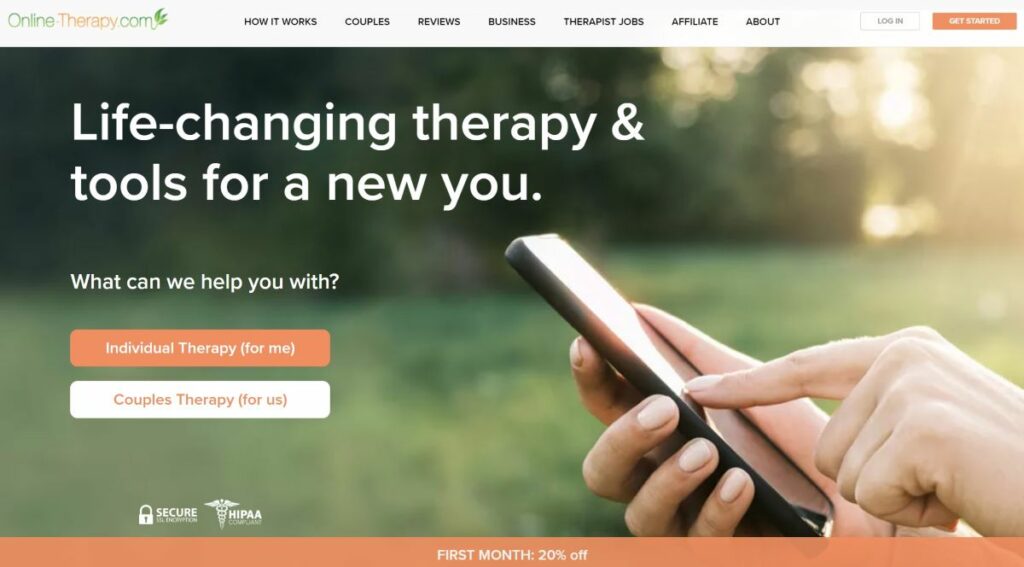
Discover transformative online therapy with Online-therapy.com. Through cognitive behavioral therapy (CBT), Online-therapy.com offers individual and couples support starting at $45/week. Engage in sessions via video, voice, or text for maximum flexibility. Fill out their online questionnaire to get started.
- Good for: Finding licensed and experienced therapists with a Cognitive Behavioral Therapy (CBT) approach.
- Location: Online therapy.
- Pricing: $40/week to $88/week (including our 20% discount first month).
- Features: Unlimited messaging with your therapist, including a daily journal and activity plan, yoga and meditation videos, and tests to see your progress.
Online-therapy.com offers a questionnaire where you can express your preference for a black therapist. therapy sessions conducted via chat, audio, or video, providing clients with diverse options to accommodate their preferences.
Read our online-therapy.com review here.
4. Inclusive Therapists

- Good for: Finding and contacting the right inclusive therapist for you.
- Location: Online and in-person therapy in the U.S., Canada, Hong Kong, Portugal, Taiwan, and Thailand.
- Pricing: Varies depending on the counselor fee.
- Features: Online directory, get matched with the right therapist for you, culturally responsive, LGBTQ+ affirming, social justice-oriented therapists.
Inclusive Therapists provide a safe and simple way to find a therapist you can feel safe and comfortable with during your sessions. Their mission is to provide clients with therapists who strive to embody principles such as anti-discrimination, anti-oppression, anti-stigma, anti-racism, and anti-ableism.
5. Onipa Psychological and Consulting

- Good for: African-centered cultural consulting sessions.
- Location: Online therapy worldwide and in-person therapy in Raleigh, NC.
- Pricing: $250 per session.
- Features: Online guided meditation, HIPAA-compliant teletherapy phone & video call, full sensory experience.
Onipa Psychological and Consulting provides a comprehensive African-centered cultural approach to individuals looking to enhance their trust and self-worth. Appointments can be scheduled at Onipa through their website or by phone.
6. Bridges To Wellness

- Good for: Trauma therapy, identity therapy, depression and anxiety treatment.
- Location: Online and in-person therapy in Chicago, IL.
- Pricing: Varies.
- Features: Interpersonal therapy, in-person therapy in Chicago, IL, contact them by phone, email, or directly in their office.
Bridges To Wellness has a network of dedicated black therapists committed to supporting individuals on their journey to wellness, assisting them in overcoming obstacles, and discovering the motivation for positive change.
7. The Hardy Clinic Wellness Center

- Good for: Finding a female therapist.
- Location: Online therapy for Georgia residents.
- Pricing: Starting at $145 per session.
- Features: Accepts insurance, sliding scale services are available, premarital counseling, choose your preferred therapist.
The Hardy Clinic Wellness Center has a team of accredited and licensed female therapists in Georgia, you can schedule an appointment by completing an intake form. This form includes essential details such as your basic information, preferred therapy type, insurance details, medical and mental health history, and your choice of therapist.
Why seek out a black psychologist?
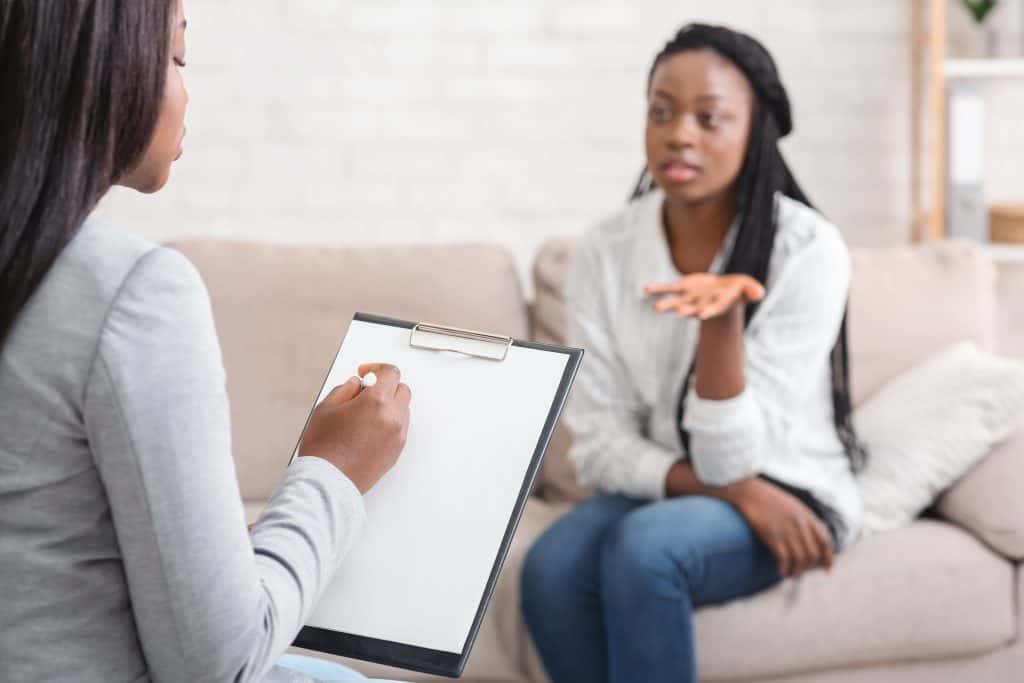
Black therapists can sometimes provide better quality mental health support for African Americans, as our culture and ethnicity influence our experience of trauma and mental illness. Your background can also affect how you interpret what you’ve been through.
Historically, mental health has been stigmatized in the black community – this is a problem that can be addressed and overcome by black psychologists.
Here are some more reasons why you might like to seek out an African American therapist specifically.
To enhance trust
Black people sometimes find it difficult to trust the mental health care system for fear of experiencing racism or discrimination, and this affects the quality of care received.
If this is a problem for you, you may trust and connect more easily with a black therapist.
To improve comfort during the mental health care process
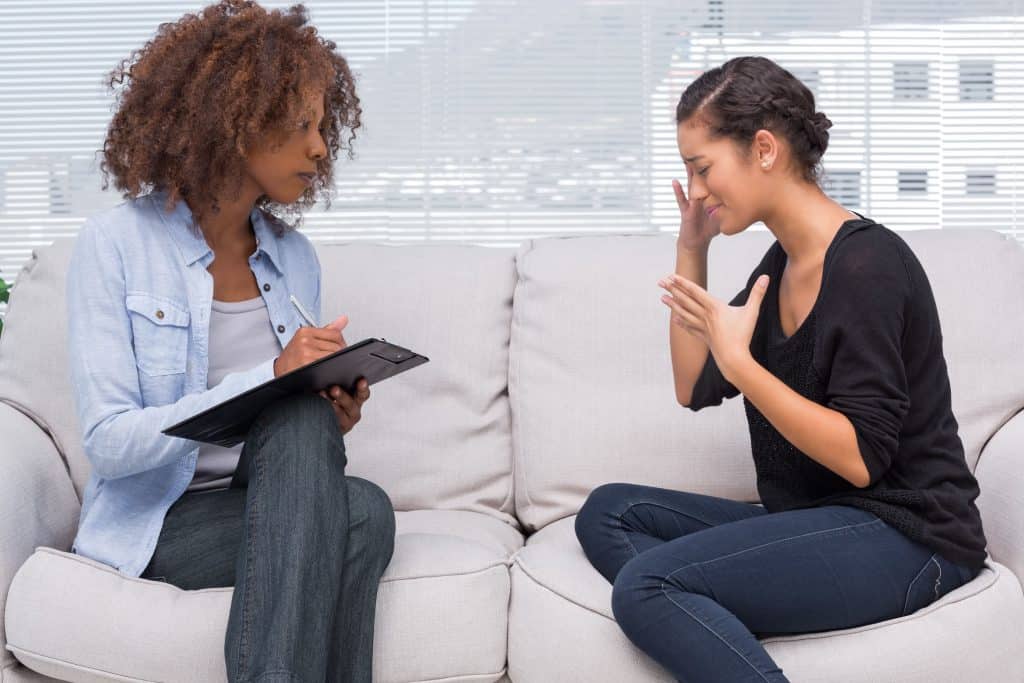
Being comfortable with your therapist is vital for the success of the therapy process. Black therapists will better understand your social and cultural dynamics, helping you feel more at ease opening up and explaining the issues you’re experiencing.
Having a therapist from the same background as you, who understands the cultural context in which your problems arise, is an act of healing in itself.
To help overcome the stigma surrounding mental health in the black community
There is a significant stigma associated with mental health treatment in the black community, which can prevent you from getting the help you need. A black therapist can help you to overcome this, and they can also make you feel more comfortable to come forward and get help.
How can a therapist understand the nature of a client’s problems if they can’t see the issues that come with their racial heritage and culture? Understanding precedes compassion, and compassion precedes healing.
All cultural groups deserve mental health treatment that pays attention to the sociocultural aspects of their behavior and shows empathy toward their situation.
Mental health problems faced by black Americans
The National Alliance on Mental Illness has considered racism a public health crisis since May 2020. Racism and stigmatization make black people prone to various psychological issues.
Some mental health problems common in black Americans are discussed below.
Racial trauma
Racial biases, cultural discrimination, and hate crimes faced by the black community make African American individuals prone to race-based stress and trauma.
Racial traumas can result in low self-esteem, panic attacks, feelings of powerlessness, mistrust of others, and an increased risk of depression and stress-related disorders.
Depression
Depression is also a serious issue experienced by people facing racism and ethnic discrimination.
Black people are sometimes reluctant to seek mental health therapy because of the stigma associated with doing so. As a result, racism-related stress or anxiety can lead to severe depression if left untreated. Martin Luther King himself was a victim of severe depression.
Anxiety
Black people may also develop anxiety, stress, and panic disorders due to increased exposure to racial discrimination.
If you suffer from an anxiety disorder, you may worry about racism and discrimination non-stop, and be unable to control these feelings.
Social anxiety is another type of anxiety, where you may have fears of being judged based on your skin tone or ethnic origin.
Post-Traumatic Stress Disorder (PTSD)

Racial traumas can lead to post-traumatic stress disorder (PTSD) if not managed in the early stages.
PTSD is characterized by disturbing thoughts, an inability to concentrate, aggressive behavior, feelings of guilt or shame, and sleeping difficulties. Often, people may also have flashbacks about the incidents they have experienced in the past when suffering from PTSD.
Eating Disorders
Eating disorders are characterized by abnormal eating behaviors, often followed by guilt and an urge to vomit. These disorders can negatively impact an individual’s mental and physical well-being.
According to the National Eating Disorder Association, black female teenagers are about fifty percent more likely to express bulimia nervosa than white female teenagers.
Conclusion
It’s perfectly acceptable to want to find a therapist who shares the same racial heritage as you. Having a black psychologist can help to provide the comfort, trust, and openness that is essential for therapy sessions to be effective.
Moreover, it is sometimes easier for people of the same ethnicity to understand each other better, making the diagnosis more accurate, and helping mental health professionals to provide better treatment.
If you have any questions about finding a black therapist, please feel free to contact us.





